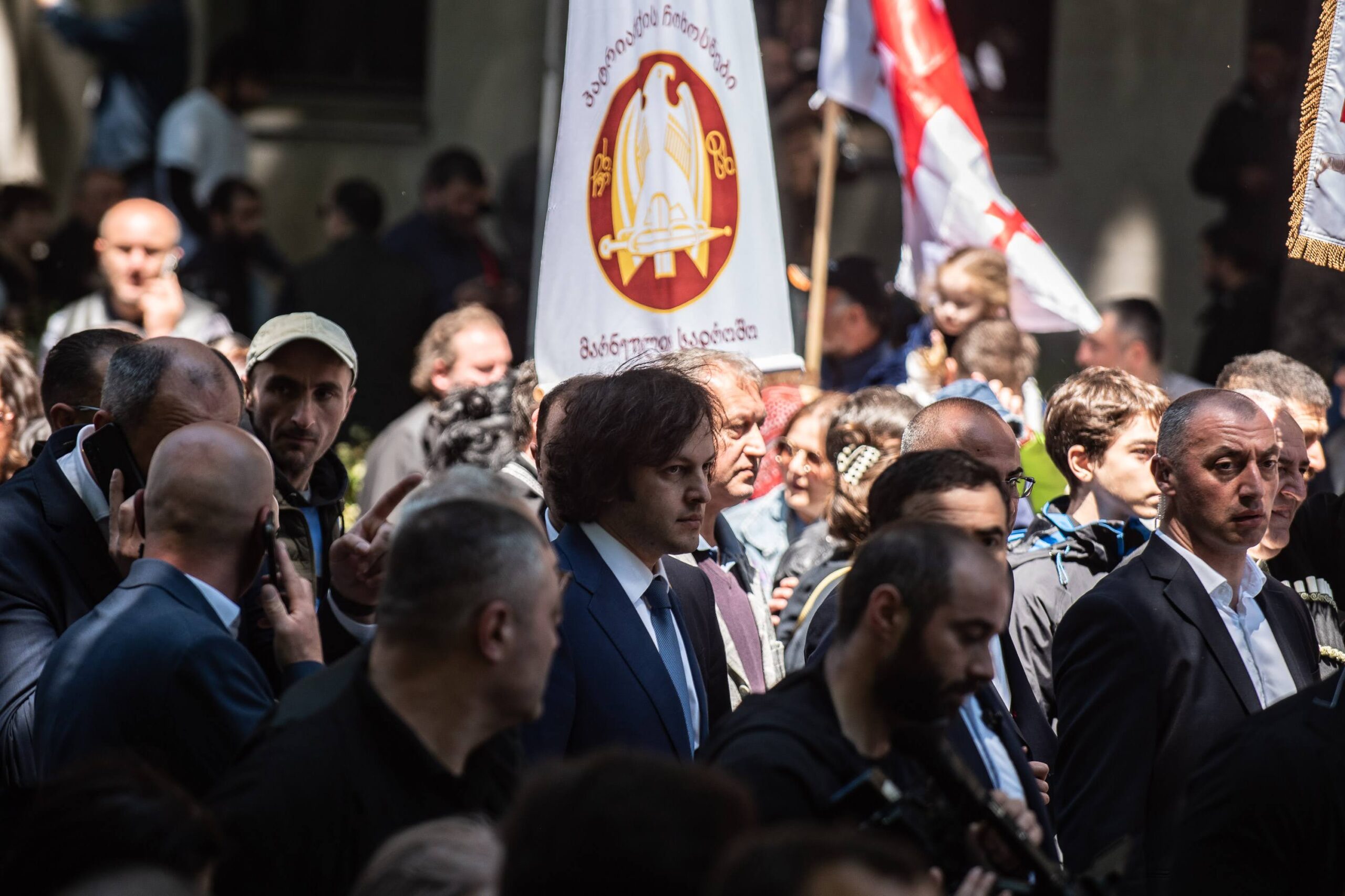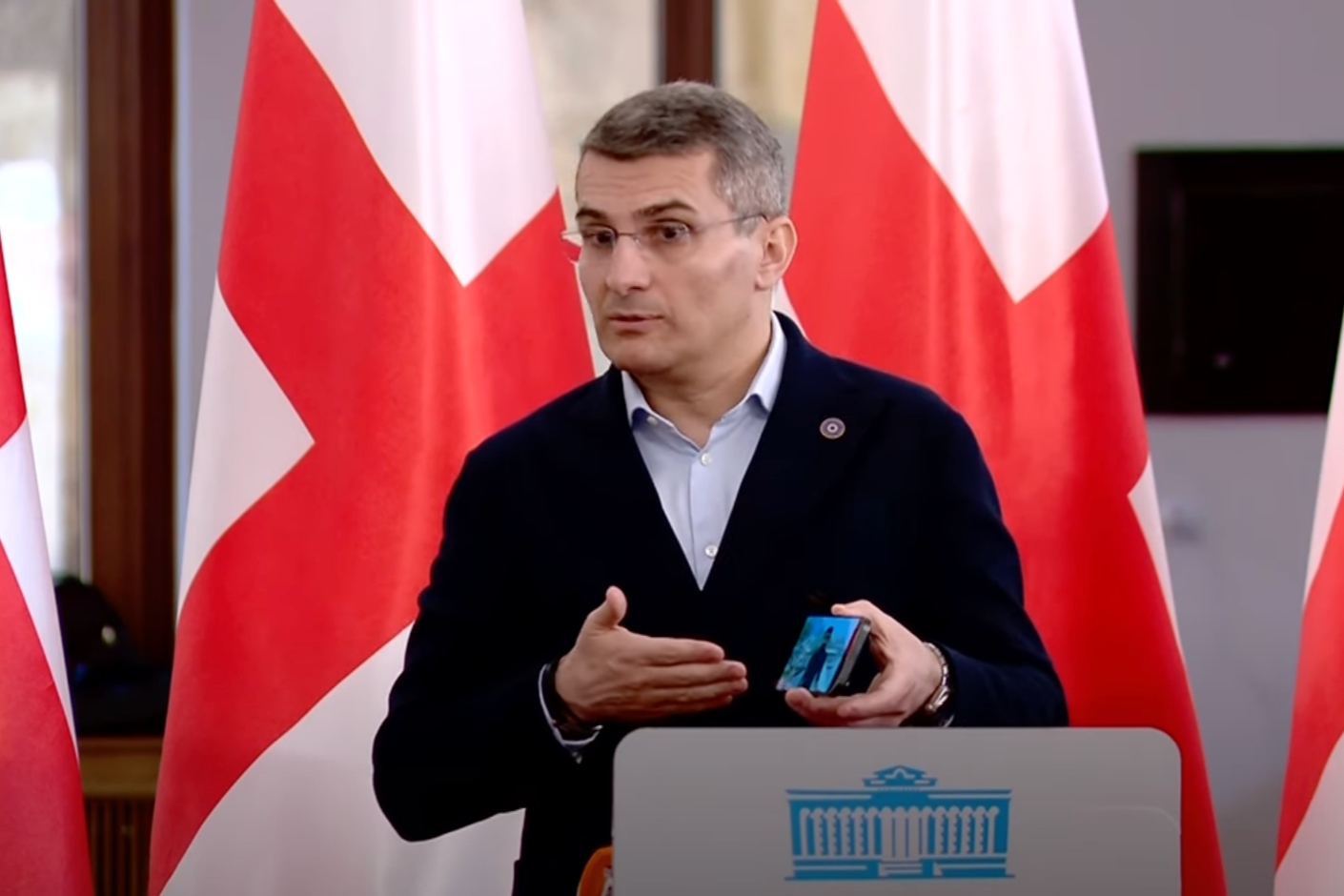
The ruling Georgian Dream party has tabled a package bill of anti-queer legislation and amendments, coming in the wake of years of rhetoric condemning ‘LGBT propaganda’. OC Media breaks down the changes, their impacts, and the ruling party’s rhetoric on the subject.
On 10 June, a group of ruling party lawmakers led by Parliamentary Speaker Shalva Papuashvili tabled a bill centred on a law ‘on protection of family values and minors’ and associated amendments to 18 existing laws.
The bill is far-ranging, affecting education, healthcare, media, business, and public gatherings, and demonstratively prohibiting a number of rights that are unavailable to queer people in Georgia. It is expected to be adopted in September.
OC Media has broken down the key points of the new law below.
1. Georgian Dream prohibits gay marriage… again
The draft legislative package reiterates several prohibitions already found in other Georgian laws.
A point highlighted by the ruling party’s leaders is its ban on same-sex marriage, defining marriage as a ‘voluntary union between two individuals of different biological sexes’. But such a provision already exists: in September 2017, the ruling party passed constitutional amendments redefining marriage as ‘a union of a woman and a man’, having previously defined marriage as a union ‘based on the equality of rights and free will of spouses’.
The 2017 constitutional changes in turn repeated amendments to the country’s civil code passed ten years prior, which specified that marriage could only apply to a heterosexual couple.
And the ban appears entirely unneeded: Georgia has seen almost no advocacy for marriage equality, with the exception of a short-lived campaign for civil unions in 2017.
The new legislation also underscores that the union of ‘two individuals of different biological sexes’ is undertaken ‘for the purpose of creating a family’, and proposes an additional passage that appears aimed at explicitly banning the legal recognition of same-sex marriages enacted outside Georgia.
However, the convoluted language of the passage could potentially ban a queer Georgian from entering a heterosexual marriage. As Article 3 (3) reads, ‘it is prohibited to register and/or legally recognise a relationship based on a sexual orientation in which at least one party self-identifies as someone whose gender differs from their biological sex or as one whose sexual orientation does not belong to a heterosexual category’.
2. Protecting ‘family purity’, prohibiting queer adoption
The legislative package appears in significant part aligned with the Georgian Orthodox Church’s demands, with the church’s patriarchate in 2023 demanding a ban on ‘LGBT propaganda’. In public discussions of the constitutional amendments, ruling party officials stated that while they had not extensively discussed the package with the Church, they would do so.

The current package bill also includes a proposal to recognise the Church’s Family Purity Day, or Sanctity of Family and Respect for Parents Day, as a public holiday. The Church has commemorated the day annually since 2014, on the same day as the International Day against Homophobia, Biphobia, and Transphobia.
The draft package bill tabled by Georgian Dream also bans queer people from adopting or fostering children, with the ban applying to people ‘with a gender different from their biological sex or whose sexual orientation does not belong to the category of heterosexuality’.
3. Don’t say gay — at school, at university, or on TV
The package bill has been widely referred to as the ‘LGBT propaganda law’, in reference to both similar Russian legislation and the Georgian bill’s strict restrictions on public discussion of queer topics.
The bill outlaws sharing information that ‘aims to popularise belonging to a gender different from one’s biological sex, a relationship based on sexual orientation between those belonging to the same biological sex, or incest’ in educational contexts, at public gatherings, in media, and more generally.
Fines for doing so range from ₾800 ($280) to ₾4,000 ($1,400), and would apply to educators, advertisers, and broadcasters, amongst others. In the event of a violation of any of these prohibitions, the amended criminal code also allows a sentence of up to two years in prison.
Speaking to journalists on 4 June, Parliamentary Speaker Shalva Papuashvili stated that the prohibition on queer ‘propaganda’ would cover broadcasters and cinemas, but not other ‘cultural events’, without elaborating further.
The 2013 Russian law on ‘protecting children from information advocating for a denial of traditional family values’ has been used to clamp down on culture, with artists, filmmakers, and musicians fined, losing funding, self-censoring, or emigrating.
4. Linking queer rights to incest
The ban repeatedly groups incest together with queer sexuality and gender identities.
The authors have failed to comment in either the proposed legislation or more broadly in public about why, if at all, they see a danger of incest being popularised amongst Georgians.
A number of right-wing governments and groups, including Russia and Hungary’s governments, have connected queer issues to paedophilia in their homophobic legislation. Both the Venice Commission and the European Court of Human Rights have criticised the moves as an attempt to further stigmatise queer people.
5. No transition, legal gender recognition, or labour rights for trans Georgians
The draft law also includes three separate articles specifically targeting transgender rights.
If passed, the bill will make it illegal to perform ‘surgery with the intent to assign sex different from one’s biological one’ in Georgia, and to amend legal documents if they do not match the person’s gender assigned at birth. At present, gender-affirming surgery is legal but prohibitively expensive for most trans people in Georgia, and, as confirmed by a local trans rights group, only one Georgian transgender person is known to have successfully changed their legal name after undergoing surgery.
Under the new laws, any medical professional performing gender-affirming surgery would be penalised with a fine, a ban from professional practice for up to three years, or imprisonment of one to four years.
The law also prohibits ‘any other type of medical manipulation’ used ‘to assign a person to a sex different from their biological sex’, meaning that prescribing gender-affirming hormones will also be illegal.
The authors also seek to prohibit employers from respecting the identities of their transgender employees in any way, stating that an employer would be prohibited from ‘disregarding or encouraging the disregarding of’ biological sex in any form of labour relations, likely including employment contracts.
Elton John, Mein Kampf, and a Netflix show: Georgian Dream’s arguments for the package bill
Georgian Dream’s main argument for the bill has been their alleged desire to protect Georgians, especially minors, from what they describe as ‘propaganda of pseudo-liberal values’ in Western democracies, which the ruling party has in recent years portrayed as a threat to Georgian identity and traditions.
[Read more: Georgian PM rails against ‘liberal’ West at far-right Budapest conference]
The ruling party have emphasised the distinction between a need for ‘defending the rights’ of queer people, which they claim to be committed to, and prohibiting ‘propaganda’ of nondominant sexuality and gender identity, which they often refer to as a ‘lifestyle’, ‘dirt’, or ‘immorality’.
At a 23 April public discussion held in the northwestern town of Ambrolauri, Georgian Dream lawmaker and bill co-author Tengiz Sharmanashvili went as far as comparing advocacy of queer people’s rights to citing Hitler’s Mein Kampf in public.
The section of the bill justifying the proposed move cited the increased numbers of people self-identifying as queer in two international studies, neither of which included Georgia.
The authors portrayed the changes as resulting from indoctrination and ‘propaganda’ against ‘family values’ in those countries, and not, as is widely understood to be the case, from improved social acceptance and legal protection.
The legislation also cited examples of Western advocacy for or conflicts relating to queer rights, including British Prime Minister Rishi Sunak ‘having to argue’ that ‘a man is a man and a woman is a woman’ in 2023, and US Department of State staffers allegedly being cautioned against using gendered terminology and misgendering others.
Pro-government media has additionally focused on allegations that ‘ladies and gentlemen’ has been increasingly scrapped as a greeting in airline announcements in Western countries, a point that parliamentary majority leader Mamuka Mdinaradze reiterated during public discussions of the bill in Ambrolauri on 23 April. None of the officials or journalists in question noted that ‘dear passengers’ has long been commonplace in public transport announcements in Georgia.

Pro-government media coverage of the issue also included claims of US President Joe Biden ‘replacing’ Catholic Christmas with Transgender Day of Visibility and portraying the Netflix adult animated series Big Mouth as a tool for ‘LGBT propaganda’ targeting minors, including Georgian kids.
Suspicions about the ruling party’s plans to initiate anti-queer legislation in Georgia surfaced last summer, when top Georgian Dream officials commented on pro-government media reports about McDonald’s mentioning prominent British gay musician Elton John’s marriage in their Happy Meals, and accused the Sulakauri publishing house of ‘spreading LGBT propaganda’.
Launching public discussion on anti-queer legislation on 22 April in Kutaisi, Mamuka Mdinaradze appeared to accept that the legislation might damage Georgia’s EU prospects, a controversial take from a party that publicly maintains that the foreign agent law has improved Georgia’s chances of EU accession.
‘If someone told you that we have to do what we’re being told to become EU members in 2030 or [someone else told you] not to follow what we’re being told, preserve our individuality and become [an EU member state] in 2035, for example — what would you choose? [20]35, right? We may face some challenges, maybe achieve results a bit later, but this is how we are going to protect our national identity’.
In a conspiracy-fuelled diatribe at a government rally on 30 April, ruling party founder Bidzina Ivanishvili suggested another purpose for the legislation being to exhaust the opposition.
‘The initiation of [draft] laws on LGBT propaganda and NGOs has had a double benefit: on the one hand, there is no alternative to legislating these two issues, and on the other hand, the premature expenditure of accumulated energy will completely drain the power of an already weakened [foreign] agency.’
As the ruling party seeks to dismantle civil society in the run-up to the coming parliamentary elections, it appears that it is ready to trample the country’s queer population on its road to power.









